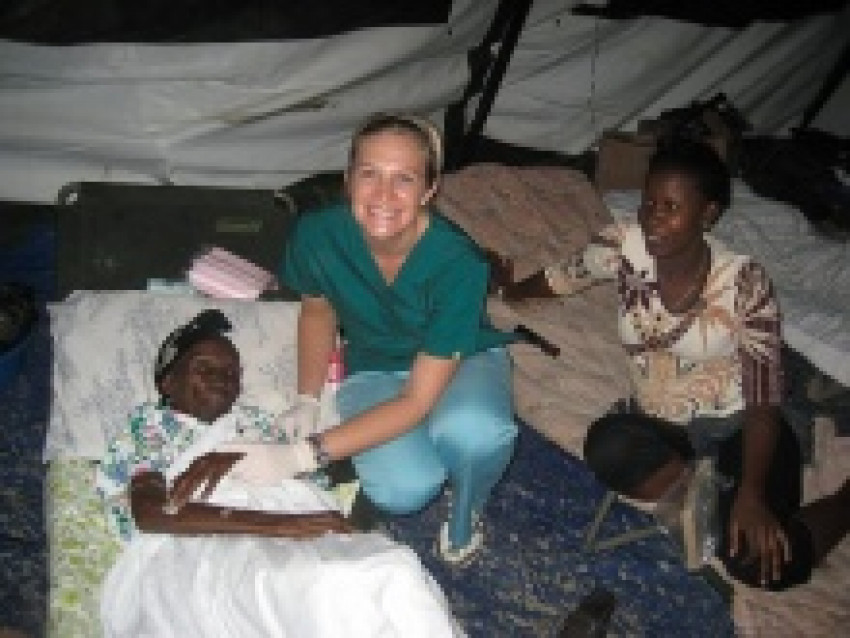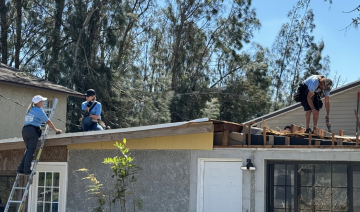
Steps Towards Haiti's Cholera Recovery
December 29, 2010
Sobering is the realization of how one year has already passed since Haiti endured their cataclysmic earthquake, and while the recovery struggles are still ongoing, their second nemesis, the cholera outbreak, is yet another ardent oppressor.
Nursing student Christi Kambs visited Haiti right after the earthquake last year, and recently returned to the Caribbean nation for eight days with three other medical professionals to work against the combative illness. Cholera has effectively spread across most of the country, infecting nearly 200,000 people. It has taken the lives of nearly 4,000 in the past two months.
Stationed mainly in Port-du-Paix for her stay, Kambs and her team worked with around 120 patients. "Two of us took the night shift, and two of us took the day shift. At the beginning we were just working to keep people alive-- administering IVs and rehydrating. Then we moved into focusing on educating and training the Haitian nurses and also revamping their entire cholera treatment camp. There was a lot of disorganization to eradicate."
Kambs had not been to Haiti since the earthquake and said it was sad to see little change. While rubble is gone, little rebuilding has taken place, and tent cities still cover Port au Prince. She says people a year ago were in shock, but hopeful, because of all of the aid coming in. But with the wave of cholera and current election violence, Haiti's hope appears to be at a breaking point.
As adamant as Kambs was about the need for reconstruction to begin to get communities back on their feet, she very pointedly emphasized the emergency situation of Haiti in reference to cholera and how the abolition of this illness must take first priority.
"Everyone responds differently [to cholera], but the elderly and children are especially susceptible because you lose so much fluid and electrolytes. People can die within a matter of hours. It's a bacteria in the intestines, and you can be vomiting, have diarrhea, and go into shock in mere hours." However, many Haitians live in the more rural areas of the mountains, so by the time their friends or family can transport them down to the clinics, patients are often already in shock or dead.
"'Doctors Without Borders'" is going out to the rural areas to shuttle people in as well as set up smaller satellite clinics to deal with it there, but it just takes time to find out where those places are," said Kambs, noting the lack of good communication in Haiti.
The most effective answer to cholera right now, is that of education. Calling it the most holistically-sound approach, Kambs said her most recent trip is a testimony to the power of sharing knowledge and getting the proper medical information into the hands of Haitian nurses.
"We lost a little baby, a three-month-old. Nurses put a fluid tube in his lungs and not his intestines. It's just a lack of education on the nurses' part, which is devastating because everybody should recover from cholera. If you get the right amount of fluids and electrolytes back into your body, you should be fine."
Often this will require preventative measures. This made Kambs' and her team's education of the families of cholera patients all the more crucial. "I can't even begin to fathom how many people are being kept from getting cholera with the education and preventative measures we shared with families. The aim was to empower individuals so that when we left they could carry on."
Much work exists, though, in terms of emphasizing the seriousness of the need for better hygiene. Kambs says the receptivity of the Haitians is there but facets of culture have kept them from understanding why cholera is ravaging their country.
"There's so much superstition and voodoo, they don't understand the biology of this. People believe cholera had to do with evil spirits and have very little understanding of how to prevent disease, so helping them understand the hygiene side of it is a huge part of what we were doing. A lot of these education efforts are going on in villages: use bleach, wash hands, etc. I think that's where Haiti will find the end of cholera."
Haiti is very much still in a state of emergency, and Kambs says the need for paramedics, doctors, and nurses is great. If such teams can go in, keep training and educating, and following through with nurses and families, then the Haitians? situation can finally begin to improve.
Post Script: The situation continues to deteriorate in Haiti & we are asking you to pray with us for God's mercy. HFI has an urgent need to deploy Paramedics, RNs, and MDs into Haiti for the cholera response effort. We have been sending rotating teams, and will continue through January and February. Medical personnel do not need to be Hope Force Reservists to deploy, however they will need to go through a screening process and a phone interview prior to deployment on a HFI Rapid Response Team. Click here for details.





